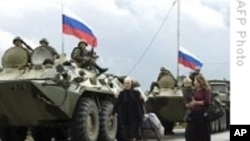A long-awaited European Union report has concluded that both Georgia and Russia bear responsibility for last year's bloody five-day conflict. The report says an unjustified Georgian military strike on breakaway South Ossetia sparked the war with Russia. But it says Russia fomented tensions in the area and its subsequent response went beyond the limits of defensive military operations.
The EU sponsored report lays the blame for the five-day war on both sides. It finds Georgia started the war last year, but only after months of provocation by Russia.
The report also accuses Georgian, Russian and South Ossetian fighters of violating international humanitarian law. It cites instances of summary executions and the burning and looting of South Ossetian villages populated by ethnic Georgians and says that investigators found no evidence to support allegations of genocide against Ossetians.
The report also accuses Russia of failing to prevent or stop violations by South Ossetian forces and armed paramilitaries after a ceasefire agreement.
Georgia's ambassador to the EU, Salome Samadashvili, says the report "proves" Georgia was invaded.
"The report has proven that it was Georgia which came under invasion by the foreign state, that the sovereign country was invaded by our neighboring country in violation of the international law," said Samadashvili. "The report has found that the pretexts which were given by our neighbor for invading our sovereign territory were, in fact, blatant lies. The report has proven that at no point has Georgia engaged in the campaign of ethnic cleansing and genocide as it was claimed by the Russian."
Russia's EU representative, Vladimir Chizhov, also welcomed the findings.
He says this report confirms what we already knew and noted in all of our statements -- that is was namely Georgia aggression and an attack on sleeping Tsikhvali the night of August 7 to 8. That was the start of the conflict, he says. He asks, Who started it? On that question, he says, the report gives an unequivocal answer.
The conflict in August 2008 left large swaths of South Ossetia in ruins and decimated the Georgian military, after a Russian invasion.
Weeks later, Moscow drew the ire of Western governments, when it recognized both South Ossetia and another breakaway territory, Abkhazia, as independent countries.
The report may also prove a useful guide for the future - it concludes with the warning that continuing tension in South Ossetia poses a real threat for the whole region.





